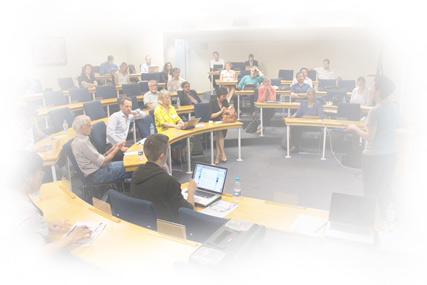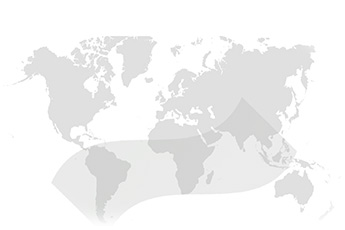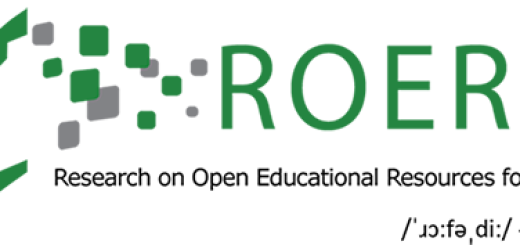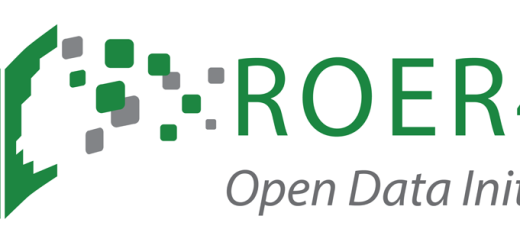Network Hub team with the Open Research award
The following article first appeared in the ROER4D May-June 2016 newsletter.
In the paper “Dimensions of Open Research: Reflections on ‘critical openness’ in the ROER4D project”, the ROER4D Network Hub described its vision of “ideological openness”: “the belief that openness in research can add value to the research process” (King et al., 2016). In this article Thomas King explains the team’s conception of Open Research and how an explicit open ideological statement can help researchers conduct their research in a more open and rigorous way.
What is Open Research?
Open Research (for the purposes of this article, synonymous with “Open Science”) is research conducted, to some degree, “in the open”. This can range from releasing final outputs in Open Access journals or repositories, providing access to underlying data, releasing early findings or interim outputs, sharing methodology statements, utilising open, collaborative approaches to peer review, or even collaboratively developing and sharing research proposals and scoping documents.
The degree to which any one researcher or research group knows and engages with these principles is, however, highly variable. Openness isn’t a single position; it is instead a spectrum of research orientations, practices and legal mechanisms that facilitate maximum reuse and collaboration around a range of research artefacts. As such, Open Research is not a methodology, but is instead a highly variable orientation, based on a set of ideas and beliefs about openness: an ideological position on openness.
What is ideological openness?
In the book, Molloy, 2011), it remains a multifaceted, highly variable undertaking. Some researchers focus on publishing in Open Access journals, others on releasing data, and some open up the process of research itself to external comment, or even participation.
This diversity of orientations and practices shares a single core idea: that in some way, the research endeavour can benefit from exposing, sharing and making more transparent the various processes in the knowledge production lifecycle. While Open Research practice holds potential cost saving benefits in terms of avoiding replication, it also has cost implications in terms of the additional time, resources and funding that is required.
The rapidly evolving terrain of Open Research and the high number of disciplinary dynamics suggests that it may be optimal for researchers and projects to develop their own ideological position towards the endeavour. Stating an explicit position on Open Research provides a guide for future practice and a touchstone for evaluating the project’s commitment to its ideological and operational principles. This position need not be dogmatic or static, but should be critical, allowing researchers to modify their approach (within the limits of their contractual and ethical constraints) as the notion of Open Research develops and as they themselves progress in their engagement with open practice.
Moreover, the absence of an explicit ideological statement does not imply the absence of an implicit ideological position. Any research project engaging in Open Research must have some concept of what Open Research entails, and this concept may not be uniform across the researchers involved in that project. In the ROER4D project, for example, many of the researchers and Network Hub members were new to Open Research when they began work on the project, held differing understandings of what openness entailed, and had different time and resourcing capacities to fruitfully engage with the concept and implement open practices.
Why ideological openness?
“Open Research” is a relatively recent term; there is therefore an element of uncertainty and innovation entailed in choosing to engage with this paradigm. In ROER4D, the desire to enact our ideological openness in conjunction with the natural congruence between OER and Open Research informed much of the Network Hub’s initial thinking around operationalising its Open Research approach right from the proposal stage. It also informed subsequent revisions to the approach that were made as the realities of coordinating a cross-regional, multilingual research project became clearer.
Is Open Research conceptually novel? Key principles underlying the traditional academic research endeavour include the production, quality assurance and dissemination of knowledge (Bartling & Friesike, 2014). Far from contradicting any of these principles, Open Research instead offers new tools and approaches to accomplish the goals that many researchers aspire to: greater quantity, quality, and access to knowledge. The ROER4D Network Hub experience has been that increased openness has demanded greater rigour in our own practice due to the “many eyes” effect (Howe 2008). The project does not share its outputs and processes publicly for the sake of it; but instead does so because it adds value, is appropriate in context, aids rigour and research capacity development, and increases the potential for our work to be cited and reused. Open Research doesn’t merely have to be an altruistic commitment; it can also be a pragmatic research strategy aimed at boosting impact, visibility and collaboration.
The technical, legal and operational imperatives that ideological openness requires are further explored in the presentation at OE Global 2016.
I’d like to thank Michelle Willmers from the ROER4D Network Hub for her insightful contributions and editorial expertise, and my colleague at CILT, Shanali Govender, for her thoughts on the nature of the academic enterprise.




